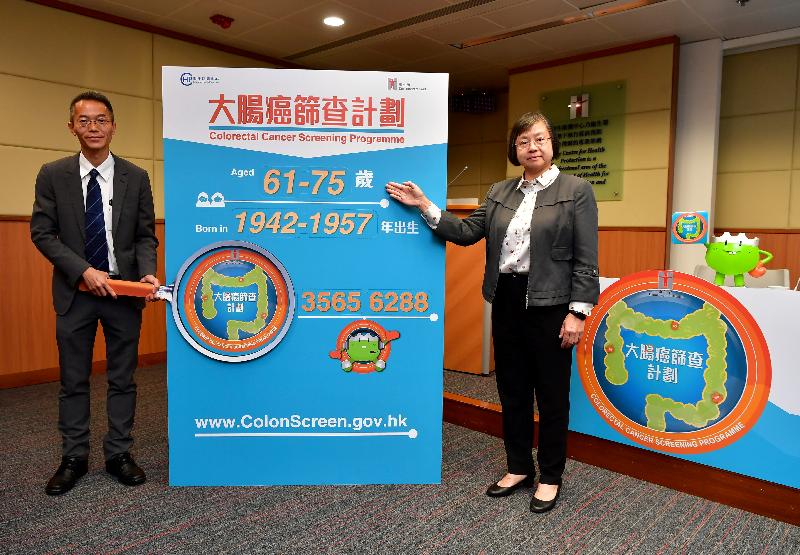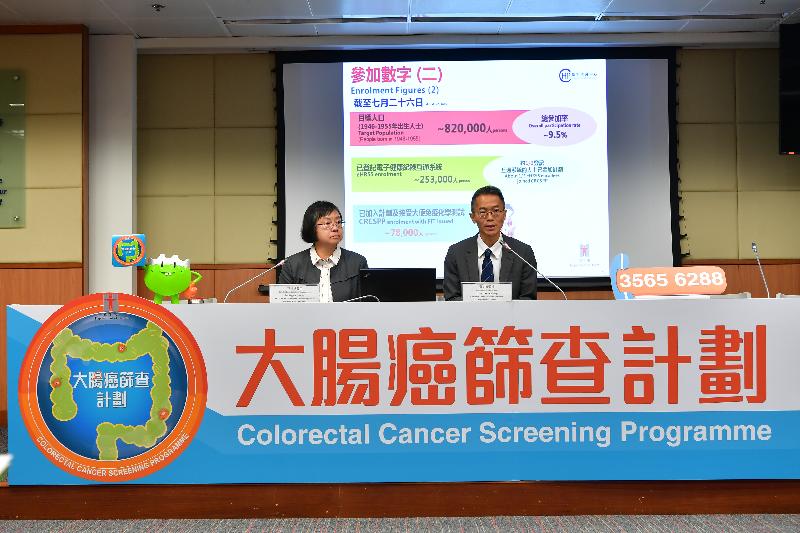Colorectal Cancer Screening Programme to be launched on August 6 (with photos)
******************************************************************************
The CRCSP will be implemented in three phases. Starting on August 6, Hong Kong residents aged 61 to 75, i.e. those born in the years 1942 to 1957, will be eligible to join phase one of the CRCSP to undergo screening tests. Phase two will cover those aged 56 to 75 while phase three will extend to those aged 50 to 75. Eligible participants will be defined by their years of birth and the details and commencement dates of phases two and three will be announced in due course.
Hosting a press conference today (July 30) to announce details of the CRCSP, the Controller of the Centre for Health Protection of the DH, Dr Wong Ka-hing, pointed out that the DH launched the Colorectal Cancer Screening Pilot Programme, which has been operating smoothly, in September 2016. The Pilot Programme has served the purpose of identifying those who have colorectal cancer before they present with symptoms or individuals at increased risk of colorectal cancer and enabling them to receive early treatment. Sustaining the success will not only benefit the individual but also provide relief for healthcare services and alleviate social and economic burdens in the long run. To regularise the Pilot Programme as the CRCSP, the Government will set aside $940 million over the coming five years.
Dr Wong said, "There is no quota for participants under the CRCSP. Taking into consideration the colorectal cancer screening recommendations of the Cancer Expert Working Group on Cancer Prevention and Screening, the Government will progressively extend the coverage of the CRCSP to Hong Kong residents aged 50 to 75, from those aged 61 to 70 under the Pilot Programme, to undergo screening tests upon regularisation. It is projected that the number of beneficiaries will be more than three times the current number, increasing from 0.82 million people to 2.55 million people. The DH will closely monitor its implementation and progress and review the services regularly with a view to fine-tuning the CRCSP and its procedures."
Colorectal cancer is the most common cancer locally. In 2015, there were 5 036 newly diagnosed colorectal cancer cases, accounting for 16.6 per cent of all new cancer cases, or about one in six new cancer cases. In 2016, colorectal cancer resulted in 2 089 deaths, accounting for 14.7 per cent of all cancer deaths, or about one in seven cancer deaths. It is the second most common cause of cancer death in Hong Kong, coming only after lung cancer.
Dr Wong explained that colorectal cancer is preventable through adopting a healthy lifestyle and well-organised screening. He said that prognosis of colorectal cancer can be significantly improved by early detection and prompt treatment. He encouraged eligible persons not to miss joining the CRCSP.
He pointed out that to combat the threat of non-communicable diseases (NCDs) including cancers, the Government this year announced "Towards 2025: Strategy and Action Plan to Prevent and Control Non-communicable Diseases in Hong Kong", setting out nine local targets to be achieved by 2025, which include reducing the risk of premature mortality from cancer. Successful prevention and control of NCDs relies on collaborative efforts by various important stakeholders including government bureaux and departments, academia, non-governmental organisations, the private sector and each and every member of society.
Also present at the press conference, the Head of the Surveillance and Epidemiology Branch of the CHP, Dr Regina Ching, said that the Colorectal Cancer Information Technology System has been set up for the Programme and rides on the electronic Health Record Sharing System (eHRSS). Dr Ching reminded prospective participants to enrol in the eHRSS before joining the Programme.
The screening pathway comprises two stages:
(1) Eligible persons must first make an appointment with a primary care doctor (PCD) participating in the Programme. After enrolment in the Programme, the participant will receive a government subsidy to undergo the Faecal Immunochemical Test (FIT); and
(2) If the FIT result is positive, the participant will be referred to see a colonoscopy specialist who has enrolled in the Programme to receive colonoscopy examination subsidised by the Government in order to find out the cause of bleeding.
The Programme is heavily subsidised by the Government. For the FIT screening arranged by the enrolled PCDs and second consultation to follow up on positive test results, the Government will provide a subsidy amount of $280 for each consultation. Under the standard colonoscopy service package, the subsidy amount is $8,500 if polyp removal is necessary, while the amount is $7,800 if no polyp removal is needed.
Dr Ching also reviewed the results of the Pilot Programme. As of July 26, about 78 000 eligible persons (i.e. 9.5 per cent of the target population) had participated in the Pilot Programme and undergone FIT screening. That was equivalent to one-third of the 253 000 age-qualified persons registered in the eHRSS.
Furthermore, as of March 27, i.e. the first 18 months after the launch of the Pilot Programme, 68 744 eligible persons had participated and undergone FIT screening. Among the participants who had submitted FIT tubes with analysed results, 8 724 persons (around 13 per cent) had positive results. Among those who underwent colonoscopy examination services, 4 966 persons (around 69 per cent) had polyps removed that revealed colorectal adenomas. As their polyps have been removed in the course of examination, there is no chance for these polyps to become cancerous, which reiterates the importance of undergoing timely screening tests for identifying people at increased risk of disease for early treatment.
To date, 685 PCDs have successfully enrolled in the Programme covering nearly 1 005 locations, and 97 per cent of these PCDs will not charge any co-payment. In addition, 170 colonoscopy specialists have joined the Programme to provide colonoscopy examination services at 331 service locations. If no polyp removal is necessary, about 80 per cent will not require additional charges. If polyp removal is needed, about 70 per cent will not require additional charges.
Lastly, Dr Ching reminded FIT-negative participants to receive FIT re-screening every two years in order to maximise the programme's capability to prevent colorectal cancer. Starting from the end of September this year, the first batch of FIT-negative participants will begin to receive re-screening notifications via SMS, email or postal mail. They can visit any enrolled PCD clinic to receive subsidised FIT re-screening services.
Those who are interested in the Programme can visit the DH's thematic website www.colonscreen.gov.hk to find a list of enrolled PCDs and more information. The DH has also set up a dedicated hotline (3565 6288), which is operated by trained staff to provide a direct response to public enquiries as a more convenient service for the public.
Ends/Monday, July 30, 2018
Issued at HKT 17:47
Issued at HKT 17:47
NNNN






